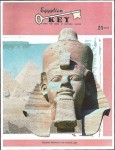 For one hundred and fifteen years, that portion of Illinois that lies south of the old Vincennes-St. Louis Trace has been known affectionately as Egypt. The old road is no more. Travel today rolls along on U.S. Highway 50 or the Baltimore and Ohio Railroad, both of which practically follow the old Trace. Twenty-eight counties make up Egypt, being those counties which lie south of the line of demarcation or are cut by it.
For one hundred and fifteen years, that portion of Illinois that lies south of the old Vincennes-St. Louis Trace has been known affectionately as Egypt. The old road is no more. Travel today rolls along on U.S. Highway 50 or the Baltimore and Ohio Railroad, both of which practically follow the old Trace. Twenty-eight counties make up Egypt, being those counties which lie south of the line of demarcation or are cut by it.
In all the history books considerable space is given to “the winter of the deep snow.” That was the winter of 1830-31. Snow fell almost continuously in the central and northern portions of Illinois for more than a month, covering the ground to a minimum of three feet, and in some places to a depth of sixteen feet.
It was Impossible to harvest the corn that remained in the fields. Corn that had been laid aside as seed had to be used as feed for man and his beasts. The result was a shortage or rather a scarcity of corn when the winter ended. A late spring followed. On September 10, 1831, a killing frost ruined the immature corn.
No corn in these prairie frontier lands meant famine and disaster. Corn must be obtained. It was not long until upstate Illinois learned that Southern Illinois had a plentiful supply of corn. In the northern counties corn was selling at three to four dollars per bushel. In the lower counties it could be bought for from twenty-five to fifty cents per bushel. As a result, caravans filled the roads to Southern Illinois, there to buy the precious grain at a reasonable price.
Many, many years before the corn famine in upper Illinois, there had been a famine in the land of Canaan. In Genesis 41:57, we read, “And all countries came into Egypt to Joseph for to buy corn; because that the famine was so sore in all lands.” In Genesis 42:2, we find further, “And so he said. Behold. I have heard that there is corn in Egypt get you down thither, and buy for us from thence; that we may live, and not die.”
The pioneers of Illinois were struck with the similitude. As the caravans rolled southward, it became an almost standard reply to questioning, “We are going to Egypt to buy corn.”
The name caught the fancy of both the residents of Southern Illinois and those who were journeying thither to buy precious food. From that time on, Southern Illinois lovingly has been called, Egypt.
Prophetically, the statement is made in Genesis 45:18, “Come unto me: and I will give the good of the land of Egypt, and ye shall eat the fat of the land.”
++++++++++++++++++++++
For further information on the snow of 1831 see, http://www.illinoishistory.com/deepsnow.htm
(Originally published in the Egyptian Key magazine, March 1947; republished in Marion Living magazine, November 2007)
